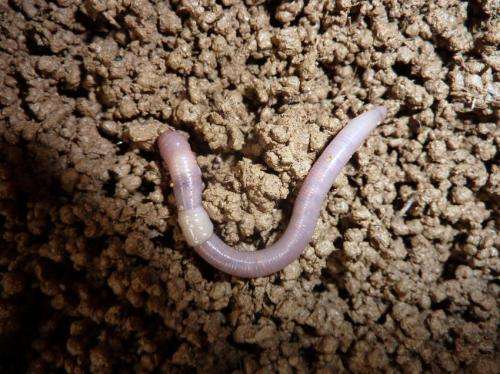Pesticides make the life of earthworms miserable

Pesticides have a direct impact on the physiology and behaviour of earthworms, a Danish/French research team reports after having studied earthworms that were exposed to pesticides over generations.
"We see that the worms have developed methods to detoxify themselves, so that they can live in soil sprayed with fungicide. They spend a lot of energy on detoxifying, and that comes with a cost: The worms do not reach the same size as other worms, and we see that there are fewer of them in sprayed soil. An explanation could be that they are less successful at reproducing, because they spend their energy on ridding themselves of the pesticide", the researchers, Ph. D. student Nicolas Givaudan and associate professor, Claudia Wiegand, say.
Claudia Wiegand is from the Department of Biology at University of Southern Denmark, and she led the research together with Francoise Binet from University Rennes 1 in France. Nicolas Givaudan is doing his Ph. D. as a joint degree between University of Southern Denmark and University of Rennes 1 in France. They researchers reached their findings by metabolomic profiling and energetic parameters.
The researchers set up an experiment to study the behaviour of the earthworm species Aporectodea caliginosa. They moved two portions of farmed soil with worms into the lab. One portion was taken from a local organic field, the other from a local conventionally cultivated field that had been sprayed with fungicide for 20 years. This soil had remnants of the internationally commonly used fungicide Opus® at a level common in fields. When crops are sprayed with fungicide, only a small part of the chemical is absorbed by the plant. The waste can be up to 70 per cent, and much of the fungicide ends up in the soil.
In the laboratory, the researchers could see how the fungicide-exposed worms adapted to the toxic environment. Over generations the worms have developed a method to detoxify themselves.
"The fungicide increased metabolism rate in the worms, both the adapted worms and the not adapted worms. In the not adapted worms we saw that their energy reserve of glycogen was used faster. Contrastingly, only in the adapted worms we saw that amino acids and protein contents increased, suggesting a detoxification mechanism. "They also increased their feeding activity, possibly to compensate for the increase in energy demand", the researchers said.
Often there are 2 - 3 times more earthworms in unsprayed soil than in sprayed soil.
"The reason for this may be that earthworms in sprayed soil do not reproduce as successfully as worms in unsprayed soil, because they need to spend more energy on detoxifying", the researchers say.
They also weighed the worms in the experiment and found that the worms exposed to fungicide weighed only half of the worms in organic soil. Worms in organic soil had an average weight of 0.6 grams, worms in conventionally cultivated soil had an average weight of 0.3 grams.
More information: Acclimation of earthworms to chemicals in anthropogenic landscapes, physiological mechanisms and soil ecological implications. Soil Biology and Biochemistry, Volume 73, June 2014. www.sciencedirect.com/science/ … ii/S0038071714000339
Provided by University of Southern Denmark




















